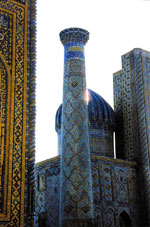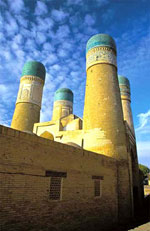

Central Asia - Uzbekistan |
| ABOUT UZBEKISTAN | ||
For many centuries, the rulers of what is today Uzbekistan were a power to be reckoned with along the Silk Road. From Samarkand, Tamarlane sallied forth to conquer much of the Eurasian continent and bring back to his capital the most gifted architects, masons and other craftsmen to add to the city's grandeur. |
||
| What to See | ||
|
||
| How to Get There | ||
| Tashkent boasts one of Central Asia s busiest air ports which has flights to many European,
Middle Eastern and Asian capitals, as well as cities throughout
the former Soviet Union and Uzbekistan Samarkand and Bokhara
also have interna tional airports as does Urgench which is near
Khiva All of Uzbekistan's primary Silk Road sites are served
by rail or motor transport as are the secon dary sites. |
||
| Where to Stay | ||
Tashkent has one five star hotel with 120
rooms three four star hotels with 885 rooms and two three-star
hotels with 564 rooms Most of these have conference facilities
There is one four star hotel with 278 rooms in Samarkand and
one three star hotel In Bukhara there is one four star hotel
with 228 rooms and one three star hotel with 183 rooms In
Urgench, serving Khiva, there two three star hotels with a
total of 341 rooms New hotels are under cons truction in all
of the above-mentioned cities with a total capacity of 1,
000 rooms. |
||
| Other Important Sites | ||
|
||
| Location | ||
The respublic of UZBEKISTAN occupyng over 447. 400 km2, is the second largest country in the Central Asia as to the territory. Uzbekistan lies in the very center of the Central Asia. This location |
||
| Relief | ||
UZBEKISTAN covering vast territory
is notable for the extremaly diverse relief: from snowy mountans
to steppes, semidesert and desert. |
||
| Klimate | ||
Climate of Uzbekistan is sharp
continental. |
||
| Population | ||
Uzbekistan is a multinational state.
There are over 22. 5 million inhabitans today. Uzbek make
65%, Russia - 25%, other nationalities (over 70) - 15%. |
||
| Language | ||
| Uzbek, the official landuage of
the country, belongs to the TURK group. Russan remains the
language of the interethnic communication. |
||
| Religion | ||
Uzbek, the official landuage of
the country, belongs to the TURK group. Russan remains the
language of the interethnic communication. |
||
| Capital | ||
The city of Tashkent with the population of 2. 7 million inhabitants. |
Copyright © 2004-2012 PAMIR TRAVEL
Made by: MabigaTeam


